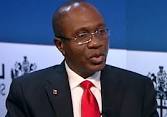
Nigeria’s economic growth data confirmed what central bank Governor Godwin Emefiele has been loath to admit: that currency controls are hurting the economy.
Growth in Africa’s biggest economy and oil exporter slowed to 2.8 percent last year, the weakest level since 1999 and down from 6.2 percent recorded in 2014. Industrial output contracted 2.2 percent last year, compared with expansion of 6.8 percent in 2014.
Tumbling oil prices have battered Nigeria, a country that relied on crude for two-thirds of government revenue. Capital controls and restrictions on currency trading imposed by the central bank to prop up the naira — and backed by President Muhammadu Buhari — have made matters worse. Rather than benefiting manufacturers, as Emefiele has claimed, the GDP data show industries such as food and vehicle production continue to suffer.
The figures “confirm widespread fears of a slowdown, possibly even a recession,” Alan Cameron, an economist at Exotix Partners LLP in London, said in an e-mailed note. “The lack of investment and access to imported inputs has hamstrung the corporate sector, and is increasingly being felt by the man on the street.”

Gross domestic product rose 2.1 percent in the fourth quarter from a year earlier, the statistics office said on Tuesday, down from 2.8 percent in the previous three months and lower than the 2.9 percent median estimate of 11 economists surveyed by Bloomberg.
The central bank’s measures have effectively pegged the naira at 197 to 199 against the dollar since March last year and hindered the ability of manufacturers to pay foreign suppliers. They’ve also caused investors such as Aberdeen Asset Management Plc and Ashmore Group Plc to sell naira bonds and stocks.
Nigeria’s main stock index has fallen 9.8 percent this year, more than any other bourse in Africa apart from Zimbabwe’s. Forwards prices suggest the naira will drop 31 percent to 288 in a year, while the black market rate is around 320 to the dollar.
Buhari, 73, became the first opposition leader to win power in Nigeria last year, riding on a wave of optimism that he would fix an ailing economy, end an insurgency by Boko Haram in the northeast and combat rampant corruption. While he has scored some successes in fighting the militants and tackling graft, investor confidence in his economic policies have waned.
Budget Delays
“We see some scope for faster growth, forecasting the economy to expand by 3.8% this year,” David Faulkner, an economist at HSBC Holdings Plc in Johannesburg, said in a note to clients. “However, much will depend on Nigeria’s exchange rate policy, with the current foreign exchange and import restrictions — imposed to stabilize the naira — having a detrimental effect on economic activity and growth.”
Lower oil output and prices contributed to the industry contracting 8.28 percent in the fourth quarter compared with expansion of 1.1 percent in the third quarter, the statistics office said. Growth in the non-oil industry, which accounts for 90 percent of GDP, was little changed at 3.1 percent.
There is little to suggest the economy has improved so far this year, according to Manji Cheto, an analyst at Teneo Intelligence in London. While the government plans to boost growth with a record $30 billion budget, lawmakers are yet to pass it.
“Growth for the first quarter of this year could be worse because nothing has happened,” Cheto said by phone. “Government hasn’t yet ramped up spending since we don’t have a budget. The performance in this quarter will drag growth down for the rest of the year. It confirms that Buhari’s government has been very slow off the line.”
END

Be the first to comment